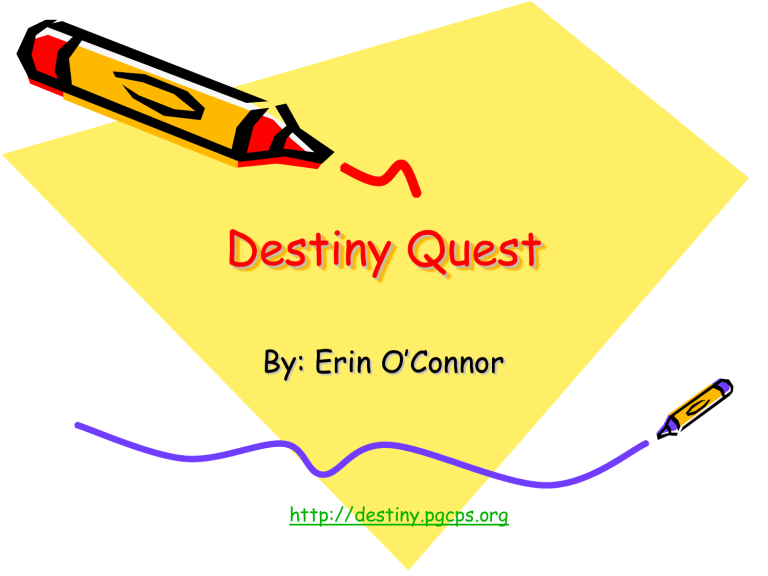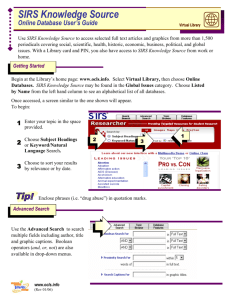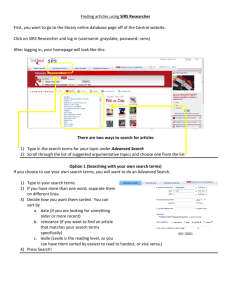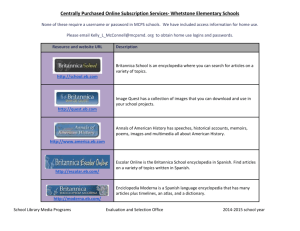Destiny Quest - OConnorLibraryPorfolio

Destiny Quest
By: Erin O’Connor http://destiny.pgcps.org
Destiny
Big 6
• Developed by educators Mike
Eisenberg and Bob Berkowitz
• Most widely-known and widely-used research process in the world
• Implemented in thousands of schools from Kindergarten to University level
• http://www.big6.com/
Six Stages of Big 6
1. Information Seeking StrategiesStudents identify all possible information sources and select the best sources
2. Location and AccessStudents locate different sources and find information from those sources
3. Use of InformationStudents engage in the information by reading, hearing, seeing, and touching.
Then they extract the relevant information
4. Synthesis - Students organize the information and present it
5. Evaluation -Students evaluate the product they created and their research process
6. Task DefinitionStudents define the problem and identify the information needed
Super 3
• Created by Michael B. Eisenberg and Robert E. Berkowitz
• Designed for primary students from the Big 6 Research Model
• Lesson Plans and ideas for Super
3 can also be found at the Big 6 website http://www.big6.com/
Research Process in Three
Simple Steps – Big 3
1.
Plan - Students plan their research project and then ask themselves:
•
•
•
What information do they want to find?
Where should they look for the information?
What would a good project look like?
2.
Do - Students read, listen, look, touch, taste, and smell in order to gain information and then ask themselves:
•
•
•
Are their notes accurate?
Are they writing good sentences and paragraphs?
Does their project have all the information it needs?
3.
Review - Students review the work they created and then ask themselves:
•
•
•
What new skills did they learn?
What did they like and dislike about the project?
What grade would they give themselves?
Landmark’s Citation Machine
The citation machine will create citations for any source your students might use (books, articles, websites, etc.) in both MLA and APA styles http://citationmachine.net/index2.php
Thinkport
• Engaging Interactive Media Resources
– Maryland and the Underground Railroad
– Welcome to Bayville
– Exploring Maryland Roots
– Sense & Dollars
• Standard-Based Lessons
• High Quality Professional Development
• Useful Technology Tools www.thinkport.com
Teaching Books
• Provides access to lesson plans, book guides, author interviews, and wealth of other information on different books
• To access Teaching Books you must sign in using PGCPS email address
• An email will be sent explaining the county login and password www.teachingbooks.net
Library of Congress
• Provides resources and information on:
– Constitution
– Primary resources
– Elections
– And much, much more http://www.loc.gov/teachers/
EBSCOhost: Student
Research Center
• Student Research Center is an easy way for students to search for information on any topic
• Powered by EBSCOhost which is the most used research search engine
• Provides the greatest number of full text articles
How to Search for
Information
• Students can search by topic
• Information is provided from:
– Newspapers
– Books and Encyclopedia
– Biographies
– Primary Sources
– Photos, Maps, and Flags
• Students can limit their search to their Lexile level http://web.ebscohost.com/src/search?sid=f7c01f f5-5057-4021-ad96-
4fe78750d3c7%40sessionmgr15&vid=1&hid=10
CultureGrams
• Provides information on different world cultures
• Students can search first by continent
• Second students can search by country
• Topics covered include:
– People and Places
– History
– Lifestyle
– Society
– Culture Facts and Contacts http://online.culturegrams.com/?a_username=MD1445& a_password=20772
Proquest
• Provides access to multiple online databases
– CultureGrams
– eLibrary
• An online database designed just for elementary school students
– SIRS Knowledge Base
• Provides access to articles in SIRS databases
– SIRS Decades
• Provides information and primary documents on 21 st Century
America
– SIRS Discover http://portal.bigchalk.com/portalweb
/home.do
SIRS Discoverer
• Database designed for students in elementary and middle school
• Students can search by keywords or choose from a list of subjects
• Students can limit their search to articles in their reading level http://discoverer.prod.sirs.com/discoweb/disco/do/frontpage
Worldbook Kids
• Designed for K-2 students
• Provides younger students with age appropriate articles, pictures, videos, and games
• Bright, easy to use, and requires very little typing
• Students search by using the very colorful subject buttons http://www.worldbookonline.com/kids/home
Worldbook Student
• Designed for students in 3 rd - 6 th grade
• Provides students with age appropriate articles, pictures, videos, citation help, and games
• Students can search by key words or Worldbook popular topics listed below;
– Research Topics
– Biography Center
– Quizzes and Activities
- Behind the Headlines
- Explore
- Most Popular Articles http://www.worldbookonline.com/student/home


